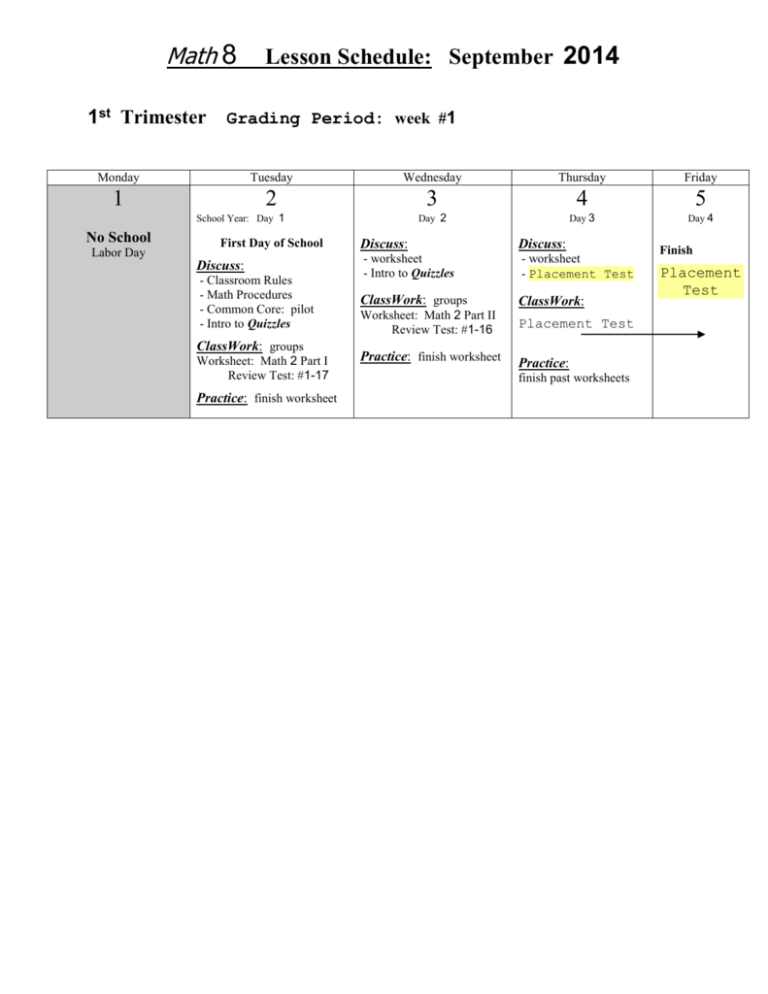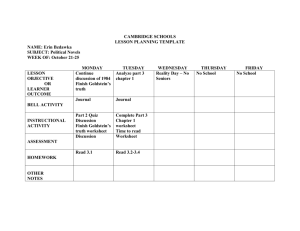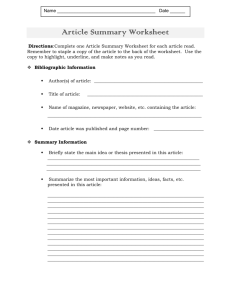week #1
advertisement

Math 8
1st Trimester
Lesson Schedule: September 2014
Grading Period: week #1
Monday
Tuesday
Wednesday
Thursday
Friday
1
2
3
4
5
Day 2
Day 3
Day 4
School Year: Day 1
No School
Labor Day
First Day of School
Discuss:
- Classroom Rules
- Math Procedures
- Common Core: pilot
- Intro to Quizzles
ClassWork: groups
Worksheet: Math 2 Part I
Review Test: #1-17
Practice: finish worksheet
Discuss:
Discuss:
- worksheet
- Intro to Quizzles
- worksheet
- Placement Test
ClassWork: groups
ClassWork:
Worksheet: Math 2 Part II
Review Test: #1-16
Placement Test
Practice: finish worksheet
Practice:
finish past worksheets
Finish
Placement
Test
Vocabulary
variable - a letter used to represent a number
constant - any number (whole, integer, fraction, decimal, etc. )
numerical expression – contains only constants and/or math operations
algebraic expression - numbers and/or variables in a math sentence
evaluate - find the value; replace the variables in an expression, then simplify to find the numerical value
Replacement Set - a set of numbers that can be substituted for a variable
Real numbers - the set of all numbers that can be represented on a number line
absolute value - distance from zero (distance is always positive): 3 3 ;
3 3
opposites - two numbers whose sum equals zero: 3 (3) 0
x ( x) 0 are called Additive Inverses
additive inverses - a number and its opposite; same distance from zero and have the same absolute value
reciprocals - two numbers whose product is 1;
1
2 1
2
3
4
4
1 are called Multiplicative Inverses
3
multiplicative inverses - a number and its reciprocal
BASE exp onent
power - repeated multiplication
23 2 2 2 8
BASE - the number to be multiplied
exponent - the raised number that tells how many factors of the base to multiply
Number Sets -
Natural numbers (counting numbers) 1,2,3,…
Whole numbers 0,1,2,3,…
Integers …-3, -2, -1, 0-, 1 ,2 , 3,…
Rational numbers: any number that can be represented as a Quotient of two Integers
Irational numbers: numbers that are NOT rational
R Real numbers: all possible numbers (Rational and Irrational numbers)
N
W
I
Q
square root - a number that is multiplied by itself to form a product = radical
radicand - the quantity under the square root symbol
radicand
principal square root - the “positive” square root
negative root
both roots
perfect square - a number whose positive square root is a whole number
9 3
16 4
25 5 etc. 1, 4,9,16, 25,36, 49,64,81,100,...
1 1
4 2
cube root - a number that is raised to the third power to form a product
3
because
8 2
23 8
3
8 2
(2)3 8
terminating decimal - has a finite number of digits after the decimal point examples: .2
1.75
repeating decimal - has a block of one or more digits after the decimal point that repeat continuously
(not all of them zero’s) examples: 0.3 2.45
repetend = the block of repeating digits
counterexample - an example that disproves a statement or shows the statement is false
closure - a set of numbers is said to be closed, or to have closure, under an operation if the result of the
operation on any two numbers in the set is also in that set of numbers.
order of operations - G E M/D A/S
the order in which to do math operations in an expression
Grouping symbols; Exponents; Multiply or Divide (left to right); Add or Subtract (left to right)
Step 1: perform operations inside the Grouping Symbols work inside outward
N
( )
[ ]
{ }
D
Parentheses
brackets
braces
fraction bar
square root
absolute value
Step 2: evaluate powers
Step 3: perform multiplication or division from left to right
Step 4: perform addition or subtraction from left to right
term - a constant; or a variable; or a product of constants & variables or a quotient of constants & variables ;
terms are separated by + and signs
like terms - terms that have the same variable parts
6.2 x 2 y3 z ;
3 x3 ; 2 x3
2 2 3
x y z
3
= same variable with the exact same exponents by those variables
2 ;7
constants are Like
Terms!
coefficient - the numerical factor; the number that the variable is multiplied by; the number in front of the variable
-------------------------------------------------------------------------------------------------------------------------------Other important vocabulary from Pre-Algebra:
=
2x 7
equation - a number sentence which states two expressions are equal: 17
solution - the value of the variable that makes a true open sentence or equation
Inequality - algebraic expressions that are NOT equal:
>
greater than
greater than
or equal to
less than
less than
or equal to
not equal to
Domain - the set of all "x" coordinates; the set of numbers that a variable may represent (Replacement Set)
Range - the set of all "y" coordinates; the "value" of the expression
Function - a rule that establishes a relationship between two quantities (numbers), the input and the output.
The input is the set of all x-coordinates and the output is the set of all y-coordinates.
There is exactly one output for each input (each x-coordinate can have only one y-coordinates).
formula - an algebraic equation that states a rule about relationships
Formulas:
A = lw
P = 2l +
D = rt
C = np
Area of a Rectangle = length x width
2w
Perimeter of a Rectangle = (2 x length) + (2 x width)
Distance traveled = rate x time traveled
Cost = number of items x price per item
linear - first degree equation; x1 (the exponent on the "x" is one and the graph is a line): y 2 x 7



